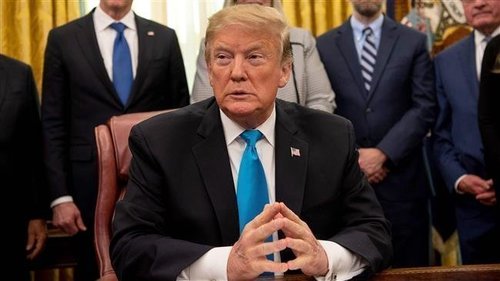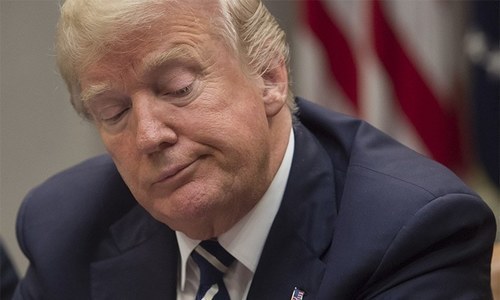China allowed its yuan to sink on Monday while US President Donald Trump said the two sides will talk “very seriously” about their war over trade and technology following tit-for-tat tariff hikes and Trump’s threat to order American companies to stop doing business with China.
The escalations prompted warnings that the chances of a settlement of the fight that threatens to tip the global economy into recession were disappearing. But Trump, speaking at the Group of Seven (G7) meeting of major economies in France, said serious negotiations would begin.
“We are going to start talking very seriously,” Trump said. He said the Chinese “mean business”.
Trump gave no details. Negotiators already were scheduled to meet next month in Washington following talks in Shanghai in July that ended with no signs of progress.
The Chinese central bank allowed the yuan to decline to 7.1468 to the dollar in tightly controlled trading. It was a relatively modest change from Friday’s low point of 7.0927 but its weakest rate since January 2008. The yuan has lost 6.5% from this year’s high on Feb 28.
Chinese leaders have promised to avoid “competitive devaluation” to help exporters in the face of Trump’s tariff hikes. But regulators are trying to make the state-set exchange rate more market oriented. That allows investor jitters about the tariff war and its impact on Chinese economic growth to push the yuan lower.
On Friday, Trump announced more tariff increases and said he was ordering American companies to stop dealing with China. He said later he was threatening to use emergency powers under a 1977 law that targets rogue regimes, terrorists and drug traffickers.
That came after Beijing announced tariff hikes on $75 billion of American imports in retaliation for earlier U.S. increases.
“This tit-for-tat escalation shows how unlikely a trade deal and de-escalation have become,” Louis Kuijs of Oxford Economics said in a report.
Chinese leaders have hardened their position, especially after Trump imposed curbs in May on technology sales to telecom equipment giant Huawei, China’s first global tech brand.
“It does not appear likely they will yield in the face of more economic pressure,” UBS economists Tao Wang, Ning Zhang and Jennifer Zhong said in a report.
The American Chamber of Commerce in Shanghai appealed to both sides to avoid further penalties and reach a settlement.
“This is not a market from which American companies can withdraw,” the chamber president, Ker Gibbs, said in a statement.
“Further escalation accomplishes nothing,” said Gibbs. “The US and China should put their energy into negotiation, not further retaliation.”
A weaker yuan would help exporters but make it more expensive for real estate developers and other Chinese companies to repay billions of dollars in foreign debt.
Trump said on Friday he would raise planned tariffs on $300 billion of Chinese goods from 10% to 15%. The US Trade Representative said tariffs already imposed on another $250 billion in Chinese imports would rise from 25% to 30% on Oct. 1 following a public comment period.
That was in response to Beijing’s announcement of tariff increases on $75 billion of American imports. The Chinese government said it also would go ahead with penalties on imports of US-made autos and auto parts that were announced last year but suspended while the two sides negotiated.
The government said those increases would take effect in two batches on Sept. 1 and Dec. 15. That matches the timeline for Trump’s plan to extend tariff hikes to $300 billion of Chinese imports.
A foreign ministry spokesman warned Beijing would “safeguard its legitimate rights” if Trump’s latest increase goes ahead.
“Threats and intimidation won’t work on us,” said Geng Shuang.
The two sides are deadlocked over how to enforce any deal. China insists Trump’s punitive tariffs must be lifted as soon as a deal takes effect. Washington says at least some must stay to make sure Beijing keeps any promises it makes.
Chinese exporters have been battered by a plunge in sales to the United States, their biggest market. But Communist leaders are resisting pressure to roll back plans for government-led creation of global competitors in robotics and other technologies.
Europe and Japan echo US complaints that Beijing’s industrial plans violate its market-opening commitments and are based on stealing or pressuring companies to hand over technology. Some American officials worry they might erode US industrial leadership.
The weakness of the yuan, also known as the renminbi, or “people’s money”, is among US grievances against Beijing. American officials complain a weak yuan gives Chinese exporters an unfair advantage and helps swell the US trade deficit with China.
China’s central bank sets the exchange rate each morning and allows the yuan to fluctuate by 2% against the dollar during the day. The central bank can buy or sell currency — or order commercial banks to do so — to dampen price movements.














































